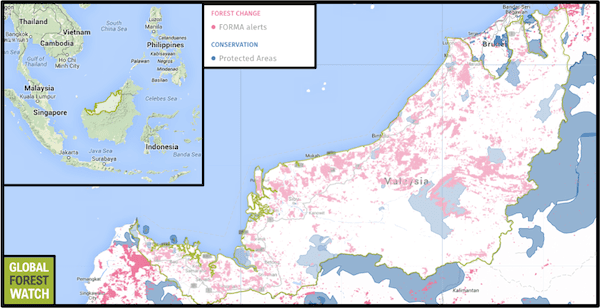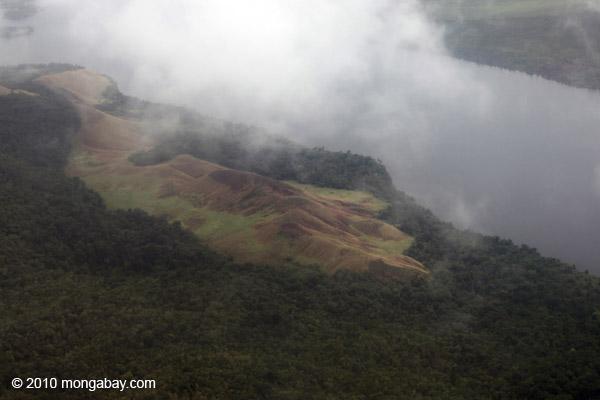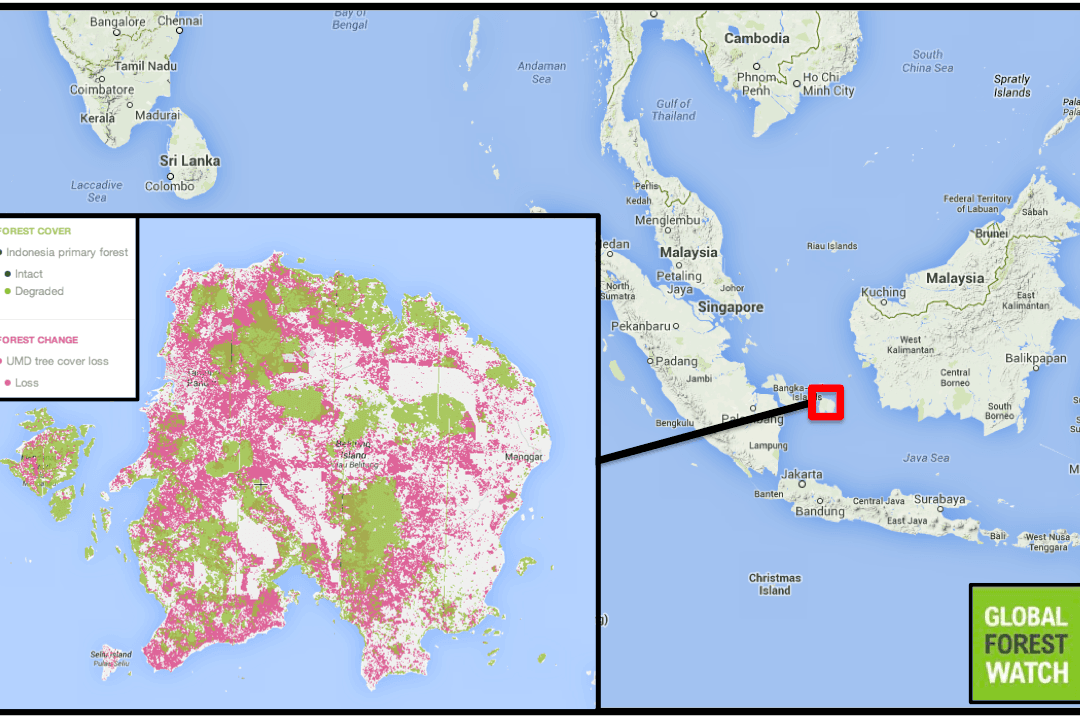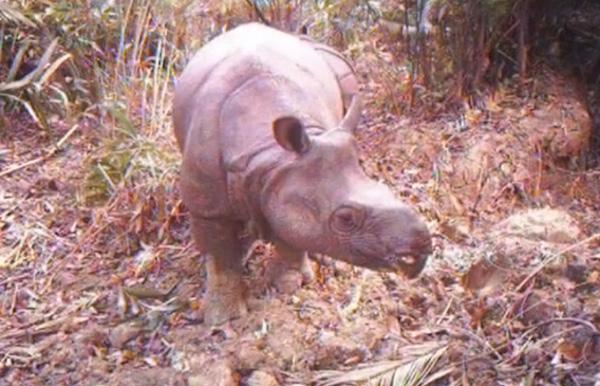A major wood fiber concession has moved ahead on developing a sizable chunk of forest in one of Indonesia’s most vulnerable provinces before a formal conservation assessment of the land could be completed, Greenomics Indonesia reports.
The organization recently published a report detailing pulpwood plantation concession company PT Mayawana Persada’s decision to build roads and a river port in areas of West Kalimantan that are known to contain high conservation value (HCV) forestland. This, before the High Conservation Value Resource Network (HCVRN) finished its peer review of an HCV report conducted by environmental consulting firm Hatfield Indonesia, according to the report.
The document also revealed 66,900 hectares of forest — nearly half of the 136,710-hectare concession — have high conservation value. Yet only 20,700 hectares of that were designated as protected at the time of the initial HCV report.
According to data issued by the International Union for the Conservation of Nature (IUCN), the remaining 46,200 hectares are critical Bornean orangutan habitat. Rampant deforestation on the island has caused the endangered species’ populations to decline significantly in recent years, with some estimates putting the number of wild Bornean orangutans left at just 45,000 individuals.
“The question that needs to be asked is what precisely motivated PT Mayawana Persada to adopt this course of action before the results of the peer review are published?” Greenomics Indonesia wrote. “The development of road infrastructure for land-clearing purposes is taking place in the remaining large forested blocks contained in the concession, which includes HCV areas.”
It’s a reasonable question, considering PT Mayawana Persada’s supposed sustainability credentials: the company is not only a member of the World Wildlife Fund’s (WWF) Global Forest and Trade Network (GFTN), but one of its shareholders, PT SJM, is a Forest Stewardship Council (FSC) certificate holder.
One possible explanation for the premature development came in the form of a rumored deal that the concession is set to supply Asia Pacific Resources International Ltd. (APRIL), Indonesia’s second-largest pulp and paper producer. APRIL announced in January that it would put a halt to its expansion activities by year’s end and stop deforesting entirely by 2019. But environmental activists have routinely accused the company’s sustainability claims of not being far-reaching enough as it continues to chop down forests.
“APRIL and its long term supply partners are in the process of completing the establishment of renewable plantation forest and will have completed plantation establishment by the end of 2014,” a source within the company told mongabay.com. “The remaining plantation areas are being established in areas that have been HCV assessed.”
The company denied that it was being supplied by the concession. “In relation to PT Mayawana, we have not yet sourced any fibre supply from them,” the source said.
When asked whether or not APRIL planned to tap the concession in the future, the source said, “We are not in a position to confirm or otherwise, suffice to reiterate that any supply depends on compliance with our Sustainable Forest Management Policy.”
West Kalimantan is home to a slew of mining, wood fiber, and palm oil concessions. The province lost 280,275 hectares of tree cover in 2012—some of which may be attributable to plantation harvesting—according to Global Forest Watch data, and is continually at risk of further environmental degradation.
Meanwhile, the Greenomics Indonesia report specifically called out WWF and said that it “needs to closely observe operations in the PT Mayawana Persada concession.” WWF Indonesia told mongabay.com it has since addressed these latest assertions that PT Mayawana Persada has commenced building infrastructure in the area.
“The Alas Kusuma Group is developing a plantation,” said WWF Indonesia GFTN representative Aditya Bayunanda, referring to PT Mayawana Persada’s holding company. “Of course, we have approached them and made certain that they [perform] assessments to make sure which areas are important, and to [develop] their plantations on previously deforested or degraded areas.”
But Aditya noted that WWF is not part of the peer review process and is only in the position to make recommendations to PT Mayawana Persada.
“We are seriously urging that the peer review is answered, a justification is made and whatever their response is, the company takes proper action,” he added. “We want all the remaining natural forest to be kept and whatever is out there not to be converted.”
The Forest Stewardship Council, on the other hand, said it was unaware of the accusations raised against PT SJM, which holds a forest management certificate that covers concessions in West Kalimantan, in addition to two chain of custody certifications.
“Our QAU [quality assurance unit] is not aware of any complaints against or infractions by PT SJM, and is currently speaking with the certification body responsible for PT SJM’s certificates to find out whether there could be any substance to the claims in this report,” FSC Communications Director Karen Bennet Van der Westhuizen told mongabay.com. “A decision will then be made about whether further investigation is warranted.”
When asked what would happen if such a probe happened to discover that PT SJM was complicit in cutting down HCV forest, Van der Westhuizen said the company’s certification could be revoked.
“If we find through a formal complaint process that an FSC certificate holder is a major shareholder — more than a 51% vote — of a company involved in the destruction of HCV, that certificate holder could lose their certification and be disassociated from FSC,” she said. “Therefore we urge organizations like Greenomics to make a formal complaint if there is evidence of wrong-doing by a FSC certificate holder.”
Greenomics Indonesia has only recommended that PT Mayawana Persada explain its recent actions and protect all 66,900 hectares of HCV forest that has been identified within its concession. So far, the company has stayed silent on the matter.
Citations:
- Hansen, M. C., P. V. Potapov, R. Moore, M. Hancher, S. A. Turubanova, A. Tyukavina, D. Thau, S. V. Stehman, S. J. Goetz, T. R. Loveland, A. Kommareddy, A. Egorov, L. Chini, C. O. Justice, and J. R. G. Townshend. 2013. “Hansen/UMD/Google/USGS/NASA Tree Cover Loss and Gain Area.” University of Maryland, Google, USGS, and NASA. Accessed through Global Forest Watch on Dec. 10, 2014. www.globalforestwatch.org.
This article was originally written and published by Ethan Harfenist, a correspondent for news.mongabay.com. For the original story and more information, please click HERE.



